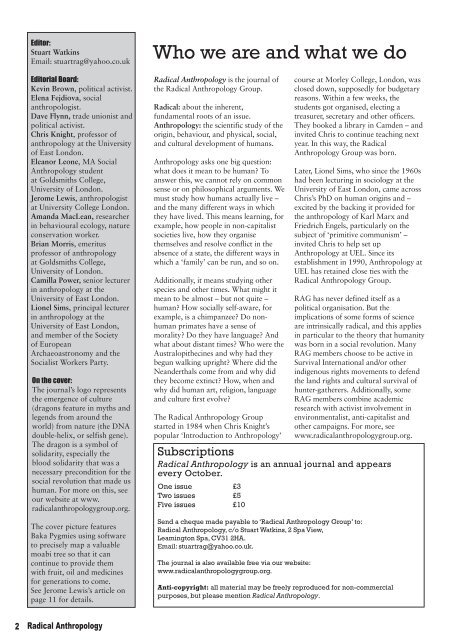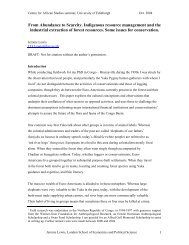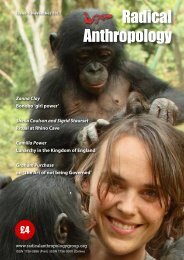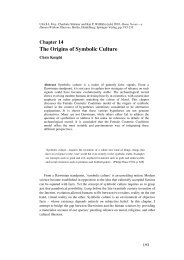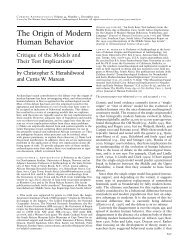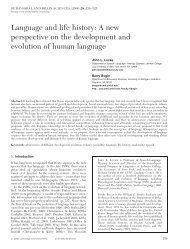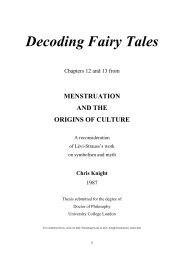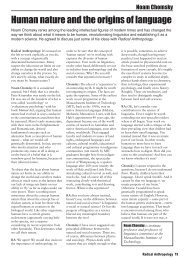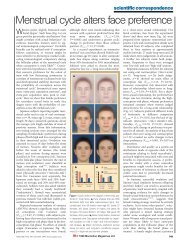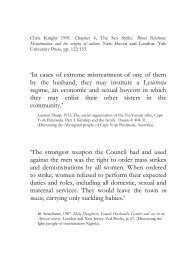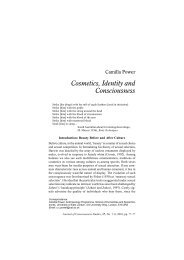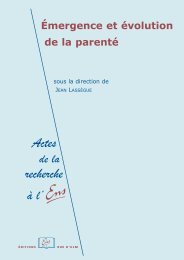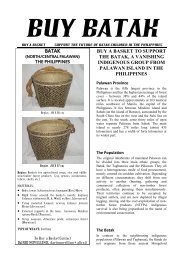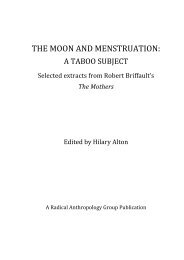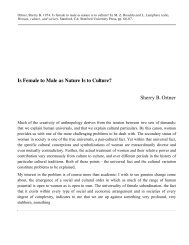The scarcity myth The scarcity myth - Radical Anthropology Group
The scarcity myth The scarcity myth - Radical Anthropology Group
The scarcity myth The scarcity myth - Radical Anthropology Group
You also want an ePaper? Increase the reach of your titles
YUMPU automatically turns print PDFs into web optimized ePapers that Google loves.
Editor:<br />
Stuart Watkins<br />
Email: stuartrag@yahoo.co.uk<br />
Editorial Board:<br />
Kevin Brown, political activist.<br />
Elena Fejdiova, social<br />
anthropologist.<br />
Dave Flynn, trade unionist and<br />
political activist.<br />
Chris Knight, professor of<br />
anthropology at the University<br />
of East London.<br />
Eleanor Leone, MA Social<br />
<strong>Anthropology</strong> student<br />
at Goldsmiths College,<br />
University of London.<br />
Jerome Lewis, anthropologist<br />
at University College London.<br />
Amanda MacLean, researcher<br />
in behavioural ecology, nature<br />
conservation worker.<br />
Brian Morris, emeritus<br />
professor of anthropology<br />
at Goldsmiths College,<br />
University of London.<br />
Camilla Power, senior lecturer<br />
in anthropology at the<br />
University of East London.<br />
Lionel Sims, principal lecturer<br />
in anthropology at the<br />
University of East London,<br />
and member of the Society<br />
of European<br />
Archaeoastronomy and the<br />
Socialist Workers Party.<br />
On the cover:<br />
<strong>The</strong> journal’s logo represents<br />
the emergence of culture<br />
(dragons feature in <strong>myth</strong>s and<br />
legends from around the<br />
world) from nature (the DNA<br />
double-helix, or selfish gene).<br />
<strong>The</strong> dragon is a symbol of<br />
solidarity, especially the<br />
blood solidarity that was a<br />
necessary precondition for the<br />
social revolution that made us<br />
human. For more on this, see<br />
our website at www.<br />
radicalanthropologygroup.org.<br />
<strong>The</strong> cover picture features<br />
Baka Pygmies using software<br />
to precisely map a valuable<br />
moabi tree so that it can<br />
continue to provide them<br />
with fruit, oil and medicines<br />
for generations to come.<br />
See Jerome Lewis’s article on<br />
page 11 for details.<br />
Who we are and what we do<br />
<strong>Radical</strong> <strong>Anthropology</strong> is the journal of<br />
the <strong>Radical</strong> <strong>Anthropology</strong> <strong>Group</strong>.<br />
<strong>Radical</strong>: about the inherent,<br />
fundamental roots of an issue.<br />
<strong>Anthropology</strong>: the scientific study of the<br />
origin, behaviour, and physical, social,<br />
and cultural development of humans.<br />
<strong>Anthropology</strong> asks one big question:<br />
what does it mean to be human To<br />
answer this, we cannot rely on common<br />
sense or on philosophical arguments. We<br />
must study how humans actually live –<br />
and the many different ways in which<br />
they have lived. This means learning, for<br />
example, how people in non-capitalist<br />
societies live, how they organise<br />
themselves and resolve conflict in the<br />
absence of a state, the different ways in<br />
which a ‘family’ can be run, and so on.<br />
Additionally, it means studying other<br />
species and other times. What might it<br />
mean to be almost – but not quite –<br />
human How socially self-aware, for<br />
example, is a chimpanzee Do nonhuman<br />
primates have a sense of<br />
morality Do they have language And<br />
what about distant times Who were the<br />
Australopithecines and why had they<br />
begun walking upright Where did the<br />
Neanderthals come from and why did<br />
they become extinct How, when and<br />
why did human art, religion, language<br />
and culture first evolve<br />
<strong>The</strong> <strong>Radical</strong> <strong>Anthropology</strong> <strong>Group</strong><br />
started in 1984 when Chris Knight’s<br />
popular ‘Introduction to <strong>Anthropology</strong>’<br />
course at Morley College, London, was<br />
closed down, supposedly for budgetary<br />
reasons. Within a few weeks, the<br />
students got organised, electing a<br />
treasurer, secretary and other officers.<br />
<strong>The</strong>y booked a library in Camden – and<br />
invited Chris to continue teaching next<br />
year. In this way, the <strong>Radical</strong><br />
<strong>Anthropology</strong> <strong>Group</strong> was born.<br />
Later, Lionel Sims, who since the 1960s<br />
had been lecturing in sociology at the<br />
University of East London, came across<br />
Chris’s PhD on human origins and –<br />
excited by the backing it provided for<br />
the anthropology of Karl Marx and<br />
Friedrich Engels, particularly on the<br />
subject of ‘primitive communism’ –<br />
invited Chris to help set up<br />
<strong>Anthropology</strong> at UEL. Since its<br />
establishment in 1990, <strong>Anthropology</strong> at<br />
UEL has retained close ties with the<br />
<strong>Radical</strong> <strong>Anthropology</strong> <strong>Group</strong>.<br />
RAG has never defined itself as a<br />
political organisation. But the<br />
implications of some forms of science<br />
are intrinsically radical, and this applies<br />
in particular to the theory that humanity<br />
was born in a social revolution. Many<br />
RAG members choose to be active in<br />
Survival International and/or other<br />
indigenous rights movements to defend<br />
the land rights and cultural survival of<br />
hunter-gatherers. Additionally, some<br />
RAG members combine academic<br />
research with activist involvement in<br />
environmentalist, anti-capitalist and<br />
other campaigns. For more, see<br />
www.radicalanthropologygroup.org.<br />
Subscriptions<br />
<strong>Radical</strong> <strong>Anthropology</strong> is an annual journal and appears<br />
every October.<br />
One issue £3<br />
Two issues £5<br />
Five issues £10<br />
Send a cheque made payable to ‘<strong>Radical</strong> <strong>Anthropology</strong> <strong>Group</strong>’ to:<br />
<strong>Radical</strong> <strong>Anthropology</strong>, c/o Stuart Watkins, 2 Spa View,<br />
Leamington Spa, CV31 2HA.<br />
Email: stuartrag@yahoo.co.uk.<br />
<strong>The</strong> journal is also available free via our website:<br />
www.radicalanthropologygroup.org.<br />
Anti-copyright: all material may be freely reproduced for non-commercial<br />
purposes, but please mention <strong>Radical</strong> <strong>Anthropology</strong>.<br />
2<br />
<strong>Radical</strong> <strong>Anthropology</strong>


